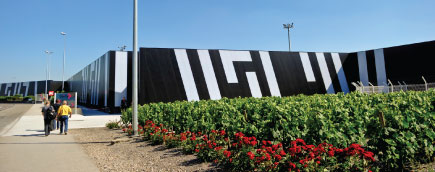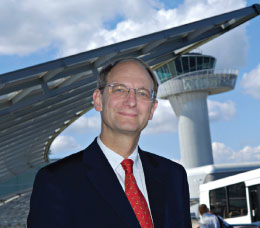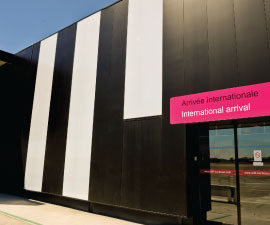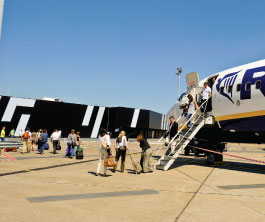
More than 250,000 passengers used Bordeaux Airport's new purpose-built low-cost terminal during its first three months of operation.
Following the opening of the new €5.5 million terminal at the end of May, Bordeaux Airport’s new facility has been the subject of continued interest not just within France, but also across much of Europe, which has experienced a rapid growth in low-cost operations in recent years.
“We had two main goals when we opened billi,” Personne explained. “The first was, of course, to increase the low-cost carriers’ network and to present the very clear signal that here in Bordeaux, low-cost carriers are very welcome.

Personne: "With our incentive marketing schemes, that we have already been working on, this will present another very clear signal that Bordeaux Airport has decided to increase low-cost capacity and network."
“The second was to reduce the cost of flights here at Bordeaux. Thanks to the special low-cost terminal, we have succeeded in reducing the operating cost for the airlines by approximately 30%.”
In contrast to the traditional airport terminal, the idea at the heart of billi is to provide a minimalist terminal, which in turn will maximise productivity. By reducing boarding queues with a pre-boarding process and speeding up the baggage collection process, this allows the airport to reduce turnaround times to less than 25 minutes.
While a total of nine low-cost airlines operate from Bordeaux Airport, billi is currently used exclusively by easyJet and Ryanair. Personne said “Thanks to billi, easyJet increased their flights with two new routes to London Gatwick and Milan-Malpensa. Ryanair has also launched new routes thanks to the introduction of the terminal, including flights to Porto, Edinburgh and Cork.”
The remaining low-cost airlines all operate from Hall A in the main terminal, but Personne explained that there is scope for them to transfer their operations to billi should they wish to do so. “The other low-cost airlines are happy with their operations at Bordeaux. For them, it’s not the same as they don’t have the same numbers, in terms of passenger and flight volumes, as easyJet and Ryanair,” he said. “If they did want to move over to billi, they would be very welcome to do so, but there is no pressure on the airlines to transfer.”
Positive response

Personne: "Recently we were approached by a Japanese airport that wanted to visit the terminal. I think this speaks volumes about the interest that billi has generated."
While Personne admits that it is inevitable that it will take time for some passengers to adjust to the nature of the new low-cost terminal, he said that feedback had, so far, been positive, especially with regard to the 800sqm commercial offering within the terminal.
He said “The feedback we have received from our commercial entities has been very good. Low-cost passengers tend to be good customers and we have a good offer because billi has quite an expansive commercial zone and so the initial feedback has been very good. This commercial zone is concentrated and is very central so all passengers clearly have to pass through it.
“As we see on a daily basis, the low-cost terminal concept is not a problem for the passenger as they don’t tend to have much free time once they arrive at the airport. Once they go through the check-in area, passengers usually spend about 10-15 minutes in the commercial area to shop for food and duty free and so on and then they have to go and board their flight.
“Out of the 260,000 passengers who have used the terminal, I would say only about 40 of them have written to us to say they were not happy with a certain part of their experience. One of the main complaints was there was not enough seating, so we’ve increased the number of seats that are available in the terminal and I think this goes to show that we take these issues very seriously.”
Future expansion

Approximately 700,000 passengers are expected to use billi during its first full year of operations.
While billi has a theoretical capacity of approximately 1.5 million passengers, the expectation is that around 500,000 travellers will pass through the terminal in 2010 and 900,000 in 2011.
However, with the airport having handled almost 3.3 million passengers during 2009, average month-on-month passenger figures for the first six months of 2010 showed an increase of +9%, with passenger traffic increasing by a standout +18% and +19% in July and August respectively.
Furthermore, Personne explained that plans are in place to make the airport even more appealing to low-cost carriers. He said “The real aim for us when we opened billi was for Bordeaux Airport to be competitive in the medium and long-term. With our incentive marketing schemes, that we have already been working on, this will present another very clear signal that Bordeaux Airport has decided to increase low-cost capacity and network.
“The increase rate is already so high that billi will probably reach this capacity limit in four or five years from now. However, when this happens, we will be able to expand the terminal as it was built with future expansion in mind.”
Having experienced strong passenger numbers and positive feedback from airlines, passengers and airport concessionaires since its opening this summer, billi is still very much in the spotlight as other airports continue to monitor the performance of the innovative terminal and its long-term viability.
“There is a lot of interest and some of the main regional French airports have asked us if they can come and visit billi,” Personne explained. “For us, this adds to the pressure as it’s the first brand new, purpose-built low-cost terminal. Most of the interest shown has been in France, but we have had interest from others. Recently we were approached by a Japanese airport that wanted to visit the terminal. I think this speaks volumes about the excitement that billi has generated.”







